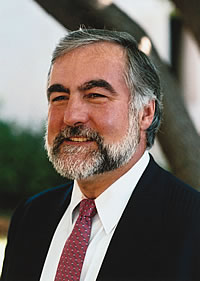|
Issue Contents :: Feature :: Statutes of Liberty :: [ 1 2 3 4 ]
Statutes of Liberty
Striking a balance between security and freedom requires alliances at home and abroad
 Bill Schulz ’71, the 10-year executive director of Amnesty International USA, returned to Oberlin in September to be honored with the Alumni Association’s Distinguished Achievement Award. While on campus, he met with students and delivered a public talk drawn from his book Tainted Legacy: 9/11 and the Ruin of Human Rights. These are his remarks: Bill Schulz ’71, the 10-year executive director of Amnesty International USA, returned to Oberlin in September to be honored with the Alumni Association’s Distinguished Achievement Award. While on campus, he met with students and delivered a public talk drawn from his book Tainted Legacy: 9/11 and the Ruin of Human Rights. These are his remarks:
When I was a sophomore in high school, I became acquainted with a religious movement that called itself Moral Rearmament. I didn’t know a lot about the organization—for example, that its founder, Frank Buchman, had notoriously said in a 1936 interview, “I thank heaven for a man like Adolf Hitler, who built a front line of defense against the anti-Christ of Communism.” I only knew it as a group of people who seemed to share a strong commitment to a clear set of values.
Moral Rearmament preached absolute moral standards. An adherent was to practice the four virtues and to practice them uncompromisingly: absolute honesty, absolute purity, absolute unselfishness, and absolute love. For a 14-year-old whose great hero, John F. Kennedy, had been killed the year before and who was struggling with emerging issues of identity and sexuality, ethics, and religion, this formula seemed eminently sensible. I would become a practitioner of Moral Rearmament. And for a few weeks I did.
For those few weeks, I tried never to lie to my parents or teachers. I tried to vanquish every impure thought from my head. I tried to be generous to a fault. And I tried to adopt an attitude of beatific love toward all of God’s creatures. But gradually it began to dawn on me that two or more of these absolute principles might occasionally be in conflict with one another. Absolute honesty, in particular, seemed perpetually at odds with the other virtues. A much beloved elderly relative of mine was notorious for her bad breath. When she was plagued by this condition and wanted me to give her a kiss, ought I do the loving and unselfish thing and simply pucker up and forget it? Or should I do the honest thing and tell her to get her teeth fixed or at least indulge in a swash of Listerine?
Those impure thoughts were a problem too. How honest was I to think that I could ever banish them entirely? But if I took the path of absolute honesty and just accepted them as a natural part of my adolescent condition, I would be condemned to violate the injunction against lustfulness. Pretty soon the appeal of Moral Rearmament began to fade. I persuaded myself that its ideas, noble as they might be, were philosophically bankrupt and that
I would need to abandon them for the sake of intellectual
consistency.
At a relatively early age, therefore, I learned the hard truth that a set of injunctions that are to be enforced in equal measure are bound to get in each other’s way. If all ten of the Ten Commandments are to be practiced at all times and with equal fervor, for example, what am I to do if my father or mother commands me to kill or to steal? How may I pay them the honor one commandment requires if I disobey their instructions to break another?
Next Page >>
|





